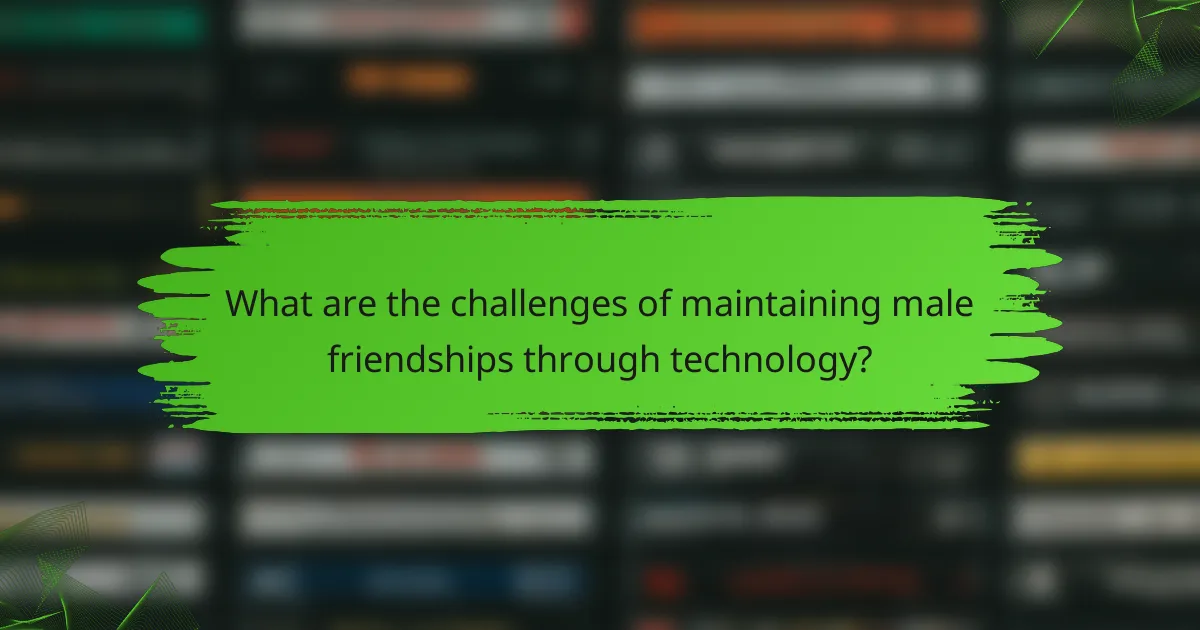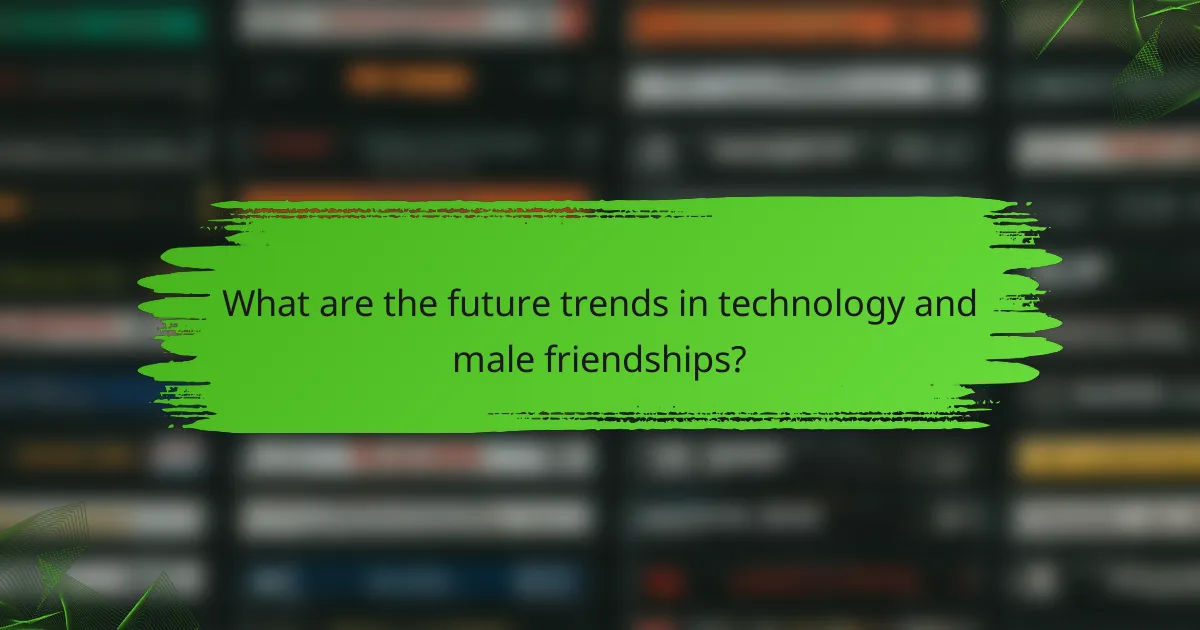In today’s urban landscape, technology plays a vital role in both forming and maintaining male friendships by offering diverse platforms for interaction. While these digital tools enable men to connect and collaborate across distances, they also present challenges such as miscommunication and a reliance on virtual interactions that can impact the quality of relationships. Nevertheless, technology can enhance these friendships by facilitating communication and creating shared experiences, allowing men to foster closeness even when apart.

How does technology facilitate male friendships in urban areas?
Technology plays a crucial role in forming and maintaining male friendships in urban settings by providing various platforms for interaction and engagement. These tools help men connect, collaborate, and communicate more effectively, overcoming geographical barriers and busy schedules.
Social media platforms like Facebook enhance connectivity
Social media platforms, particularly Facebook, allow men to stay connected with friends and acquaintances through posts, comments, and shared experiences. These platforms facilitate the discovery of mutual interests and events, making it easier to plan meet-ups or group activities.
By joining groups or communities that align with their hobbies, men can expand their social circles and engage with like-minded individuals. This can lead to deeper friendships as they share experiences and support each other in various pursuits.
Online gaming fosters collaboration and bonding
Online gaming serves as a unique avenue for male friendships, promoting teamwork and collaboration. Many games require players to work together to achieve common goals, which can strengthen bonds and create a sense of camaraderie.
Through voice chat and in-game interactions, players often develop friendships that extend beyond the gaming environment. Regular gaming sessions can lead to lasting connections, as players share victories and challenges together.
Messaging apps streamline communication
Messaging apps like WhatsApp and Telegram simplify communication among friends, allowing for quick and easy exchanges of messages, photos, and videos. These platforms enable men to maintain regular contact, regardless of their physical location.
Group chats can be particularly effective for organizing social events or sharing updates, ensuring that friendships remain active. Setting reminders for regular check-ins or virtual hangouts can help sustain these connections over time.

What are the challenges of maintaining male friendships through technology?
Maintaining male friendships through technology presents several challenges, including miscommunication and an over-reliance on digital interactions. These issues can hinder the depth and quality of relationships that often thrive on face-to-face communication.
Miscommunication due to text-based interactions
Text-based communication can lead to misunderstandings, as tone and intent are often lost in messages. Without vocal inflections or body language, messages may be interpreted differently than intended, causing friction between friends.
For example, a simple joke might be taken seriously or an urgent message could be overlooked. To mitigate this, using voice notes or video calls can help convey emotions more clearly, reducing the chances of misinterpretation.
Over-reliance on digital communication
While technology facilitates easy communication, excessive reliance on it can weaken friendships. Friends may become accustomed to texting rather than meeting in person, which can diminish the emotional connection and shared experiences that strengthen bonds.
To counteract this, it’s beneficial to schedule regular in-person meetups or phone calls. Setting a goal to meet at least once a month can help maintain the friendship’s vitality and ensure that both parties feel valued and connected.

How can technology improve the quality of male friendships?
Technology can significantly enhance male friendships by facilitating communication and creating shared experiences. Through various digital platforms, men can maintain connections, engage in activities together, and foster a sense of closeness despite physical distances.
Video calls create a sense of presence
Video calls allow friends to see and hear each other in real-time, which can mimic in-person interactions. This visual connection helps to strengthen emotional ties and makes conversations more engaging compared to text-based communication.
Platforms like Zoom, Skype, or FaceTime offer easy access to video calls. Scheduling regular catch-ups can help maintain friendships, with many finding that even short weekly calls can keep relationships vibrant.
Shared online experiences strengthen bonds
Participating in online activities together, such as gaming or watching movies, can enhance friendships by creating shared memories. These experiences can be as simple as playing a multiplayer game or streaming a film simultaneously while chatting.
Consider using platforms like Discord for gaming or Netflix Party for movie nights. These shared experiences not only provide entertainment but also foster deeper conversations and connections, helping friends feel more involved in each other’s lives.

What role do dating apps play in male friendships?
Dating apps increasingly serve as platforms for forming and maintaining male friendships by facilitating connections beyond romantic interests. These apps provide tools and features specifically designed to help men find platonic relationships, expanding their social networks.
Dating apps like Bumble BFF promote platonic connections
Bumble BFF is a notable feature of the Bumble app that allows users to seek friends rather than dates. This function encourages men to connect with others who share similar interests, hobbies, or lifestyles, fostering genuine friendships.
Users can create profiles highlighting their interests and preferences, making it easier to find compatible friends. Engaging with potential friends through messaging and shared activities can lead to meaningful connections that might not have occurred otherwise.
Networking features on apps expand social circles
Many dating apps incorporate networking features that help users broaden their social circles. For instance, platforms like Meetup and Facebook Events allow users to discover local gatherings, clubs, or activities, enhancing opportunities for male friendships.
By participating in these events, men can meet others with similar interests in a relaxed environment. This approach not only helps in forming friendships but also encourages ongoing interactions, which are crucial for maintaining those connections.

How do cultural factors influence male friendships in the digital age?
Cultural factors significantly shape male friendships in the digital age by affecting how men communicate and connect online. Variations in cultural norms, values, and expectations influence the formation and maintenance of these relationships, often dictating the platforms used and the nature of interactions.
Regional differences in communication styles
Communication styles among men can vary widely across different regions, influenced by local customs and social expectations. For instance, in some cultures, direct and assertive communication is valued, while in others, indirect and subtle approaches are preferred. These differences can affect how friendships are initiated and sustained online.
In regions where humor and banter are common, platforms like social media may facilitate friendships through playful exchanges. Conversely, in cultures that prioritize formality, men might lean towards more structured communication methods, such as email or professional networking sites.
Impact of societal norms on friendship dynamics
Societal norms play a crucial role in shaping the dynamics of male friendships, particularly regarding emotional expression and vulnerability. In cultures that encourage emotional openness, men may find it easier to share personal experiences and seek support from friends, fostering deeper connections.
On the other hand, in societies where stoicism is valued, men might struggle to express their feelings, leading to more superficial friendships. This can result in a reliance on technology for connection, as digital platforms may provide a perceived barrier that makes sharing easier without the pressure of face-to-face interactions.

What are the future trends in technology and male friendships?
Future trends in technology are reshaping how male friendships are formed and maintained, emphasizing virtual interactions and support systems. Innovations such as new platforms for online gatherings, AI-driven matchmaking, and mental health apps are becoming increasingly significant in fostering these connections.
Emerging platforms for virtual hangouts
Emerging platforms are revolutionizing the way men connect virtually, offering spaces for casual interactions and deeper conversations. Apps like Discord and Clubhouse allow users to create or join interest-based communities, facilitating both social and gaming experiences.
These platforms often feature voice and video capabilities, making it easier to replicate in-person hangouts. Users can engage in real-time discussions, share experiences, and participate in activities together, enhancing the sense of camaraderie.
AI-driven matchmaking for friendship
AI-driven matchmaking is gaining traction in helping men find compatible friends based on shared interests and values. Algorithms analyze user profiles and preferences to suggest potential connections, streamlining the process of forming friendships.
Some apps even incorporate personality assessments to refine matches, making interactions more meaningful. This technology can help overcome barriers to initiating friendships, especially for those who may feel shy or uncertain in social settings.
Increased focus on mental health support through apps
The growing emphasis on mental health is reflected in the development of apps specifically designed to support men’s emotional well-being. These applications often include features like mood tracking, guided meditations, and access to professional resources.
By integrating social components, such as group chats or forums, these apps encourage users to share their experiences and seek support from peers. This trend not only fosters friendships but also promotes a culture of openness regarding mental health among men.



